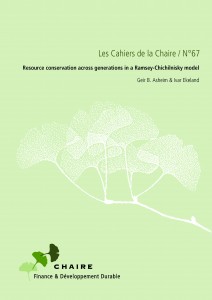 by Geir B. Asheim & Ivar Ekeland
by Geir B. Asheim & Ivar Ekeland
The Chichilnisky criterion is an explicit social welfare function that satisfies compelling conditions of intergenerational equity. However, it is time inconsistent and has no optimal solution in the Ramsey model. By investigating stationary Markov equilibria in the game that generations with Chichilnisky preferences play, this paper shows how nevertheless this criterion can be practically implemented in the Ramsey model, leading to attractive consequences. The time-discounted utilitarian optimum is the unique equilibrium path with a high-productive initial stock, implying that the weight on the infinite future in the Chichilnisky criterion plays no role. However, this part of the Chichilnisky criterion may lead to more stock conservation than the timediscounted utilitarian optimum with a low-productive initial stock. Based on the notion of von Neumann-Morgenstern abstract stability, we obtain uniqueness by assuming that each generation coordinates on an almost best equilibrium and takes into account that future generations will do as well.
